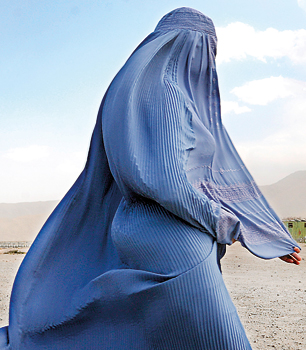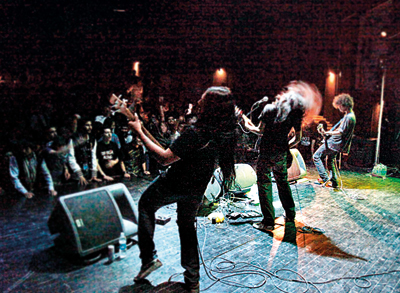Sunday Times 2
Beneath the burqa: Afghan women opt for cosmetic surgery
KABUL, Dec 7, 2012 (AFP) – Despite living much of their lives behind a veil, some Afghan women are feeling pressure to conform to ideals of female beauty and are lining up for cosmetic surgery at a handful of clinics in Kabul.
A few years ago, most operations would have been to repair war wounds or scars from family violence, acid attacks or attempts at self-immolation by women driven to despair by hard times in a male-dominated society.

An Afghan burqa clad pedestrian walks as a girl looks on in the old city of Herat (AFP)
Now, nose jobs are most popular, but facelifts, breast enhancement and tummy tucks are also sought after.
“Ten years ago it was all about repairing scars,” said Dr Aminullah Hamkar, 53, who runs a Kabul clinic.
“When I sometimes ask the young people who come here why they want cosmetic operations, they simply say they want to look better and beautiful,” he told AFP.
This was a good sign, he said, showing that people, at least in the capital, were moving beyond the violence of a hardline Islamist Taliban insurgency and contemplating ideas usually reserved for times of peace.
“I was always jealous to see my sisters and others had longer and bigger noses while my nose was small and flat,” said Shaida, an 18-year-old girl who had a nose enlargement at Hamkar’s clinic.
Shaida is from the minority Hazara ethnic group, many of whom have slightly Mongolian looks, with almond eyes and noses that are flatter than those of other Afghans.
Shaida, who works as a policewomen, sought cosmetic surgery after seeing some of her friends and colleagues change the shapes of their noses and eyes.
“Now that I have a bigger nose, I feel more comfortable and satisfied,” she said smiling.
The two surgeons at the clinic perform about two cosmetic procedures each week, apart from their regular plastic surgery for medical or reconstructive purposes.
Most cosmetic operations are done under local anaesthetic to cut costs. And for nose enlargement, instead of using silicon, the surgeons cut cartilage from a rib, carve it to the right shape and use that.
A typical nose enlargement costs about $300, more than a month’s salary for many Afghans, but since the ousting of the Taliban regime 11 years ago, the influx of billions of dollars in aid has led to the emergence of a growing middle class.
They have been exposed to trends in Iran, Dubai and European countries, and are willing to pay for plastic surgery purely for cosmetic reasons.
Hamkar tells the story of an 18-year-old woman whose husband complained on his return from working in Dubai that her breasts were sagging and not up to the standards he had seen abroad and he didn’t want her any more.
The girl, from a conservative and insurgency-plagued province in eastern Afghanistan, had married, had children early and had breast-fed them. “Now for me, who has worked as a plastic surgeon for years, seeing such cases in other countries was nothing new, but this was something new here in Afghanistan,” the doctor said.
“Her husband travels to a liberal, more open city like Dubai, probably sees beautiful and in-shape women and upon his return home he dislikes his wife’s shape and even approves her visiting a plastic surgeon.
“Many people’s perceptions of life and sex change upon their return from a trip to a less conservative place.”
Mohammad Ibrahim, a former army officer whose daughter wanted to make her nose smaller — the family belongs to the Tajik ethnic group — says he agreed with the operation as it would make her feel better.
“Back in the sixties and seventies, the governments then would encourage us to learn about different cultures and even as government employees they helped us travel to different countries.”
But decades of war after a Soviet invasion in 1979 and the rise to power of the Taliban “deprived our youths from their god given and human rights”.
“Today we enjoy a relative democracy and I don’t want my daughter to feel ugly and isolated,” he said. “That’s why I easily agreed to bring her here, so she can have a better nose and feel happy.”
Follow @timesonlinelk
comments powered by Disqus






















